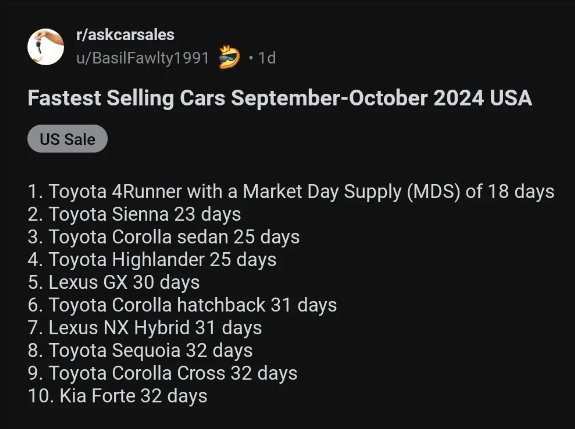@Taj
At the start of the year, the CEO said they would slow down production to focus on quality and reliability. He mentioned that the previous pace was too much for the company.
Brook said:
@Taj
At the start of the year, the CEO said they would slow down production to focus on quality and reliability. He mentioned that the previous pace was too much for the company.
Haha! As someone who’s been with Toyota for a long time, I can tell when they’re putting out a PR statement. At the end of the day, it’s all about their image and profits.
@Taj
You might actually have some valuable insights.
How much were you producing before COVID, and how much overtime did you work then compared to now? Are you building more hybrid RAV4s or gas-only models? Do hybrids take longer to assemble? And are you still allowed to stop the line if there’s an issue?
Would be interesting to hear from someone with real experience in the factory, rather than us speculating.
@Brook
Before COVID, we were working almost max hours, and last year we were back to that pace. But earlier this year, we suddenly went down to just 8-hour shifts, which is really rare for us. As for hybrids vs. gas models, hybrids do take a bit longer to build, but I’m not sure of the exact production mix.
@Taj
Think there could be a bottleneck somewhere in the supply chain?
Magdalina said:
@Taj
Think there could be a bottleneck somewhere in the supply chain?
Possibly, but if there is, it’s affecting a lot of models, not just one or two.
Brook said:
@Taj
At the start of the year, the CEO said they would slow down production to focus on quality and reliability. He mentioned that the previous pace was too much for the company.
I like the way you think!
@WilliamMia
Thanks! This is really helpful information.
@WilliamMia
No way this is accurate. Where’s the RAV4? It’s supposed to be their best-seller, not a Lexus.
@WilliamMia
I haven’t heard of any RAV4s sitting on lots. People have been waiting months to get them!
Toyota and Lexus together sell around 11 million vehicles each year. For comparison, the Volkswagen Auto Group comes in second at about 9 million.
So, Toyota has an inventory problem (not great) because they have a demand problem (very good).
They sell everything they build. If you see other car brands with full lots, it means people are buying Toyotas instead. Maybe if folks bought other brands, Toyota could catch up with demand.
Our local dealership has a lot of inventory. My salesperson said it varies depending on the region.
Every industry has different supply chains, so saying they’re fully caught up might not be accurate without knowing how their specific supply chain is set up.
RAV4s are still super popular, and they’re one of the hardest cars to find in stock.
One of Toyota’s Indiana plants, where they make the Grand Highlander, has been shut down for a while. That’s limited the number of vehicles they can produce overall.
Actually, what you see as low inventory is just the new normal. After COVID, Toyota adjusted their production approach.
Chandler said:
Actually, what you see as low inventory is just the new normal. After COVID, Toyota adjusted their production approach.
Could be. I remember the good old days when the lots were packed with choices.
Chandler said:
Actually, what you see as low inventory is just the new normal. After COVID, Toyota adjusted their production approach.
Toyota is pushing for just-in-time production and shifting to a ‘click and collect’ model.
Internally, they claim it’s because ‘Gen Z wants it this way,’ but it also helps them cut back on the power of dealerships, kind of like Tesla’s direct-to-consumer model.
It’s so odd! I was in Maine for six months, and the lots there were full of base model Tundras, Tacomas, and RAV4s. Everything was base or SR5 trim. There was one Capstone Tundra that sat for months—never seen that before. When I got back to Virginia, it was back to empty Toyota lots with only used cars. Also, the sales teams seem a lot smaller now—like three to six salespeople, compared to the huge teams they used to have.
